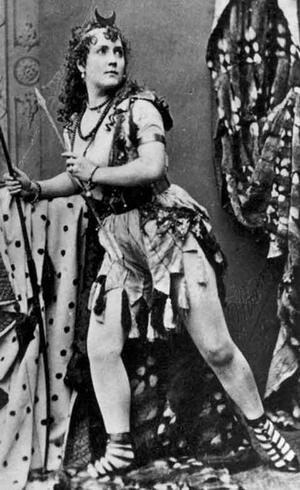Racy actress Adah Isaacs Menken appears in her last performance
Little is definitively known about the private life and early history of actress Adah Isaacs Menken. She seems to have been born in Louisiana, either in New Orleans or in nearby Milneburg, in 1835, but other sources place her birth in Tennessee. She always claimed to have been born into a Jewish family, but some scholars contend that she was raised Catholic and converted to Judaism with her first marriage.
If her early life is obscure, Menken made sure her later life was exactly the opposite. With four marriages in seven years, a flamboyant stage career, and a command of self-promotion, Menken rose quickly to notoriety. At a time when women were expected to be quiet, domestic, self-effacing, and out of the public spotlight, Menken smoked cigarettes, cropped her hair, and played provocative stage roles.
Of all her exploits, it was Menken's role in the melodrama Mazeppa that brought her the most lasting fame. In this adaptation of a Lord Byron piece, which opened in Albany, New York, in 1861, Menken appeared in a flesh-colored body stocking which gave the illusion that she was nude. Moreover, she appeared strapped to the back of a horse, which galloped down a ramp in the direction of the audience. The fact that Menken was an accomplished equestrian and the horse a tame one did nothing to dispel the illusion of danger. She later performed the same role in London, and this and other roles in Paris, Vienna, and all over the US.
Although she fed the cult of personality that grew up around her by, for example, placing photographs of herself in shop windows, Menken also aspired to recognition off the stage, primarily as a poet. Several of her poems were published in the Cincinnati-based Israelite when she lived in Ohio from 1857–59; later poems were published in the New York Sunday Mercury (1860–61). Walt Whitman encouraged her writing, and she developed friendships with Mark Twain, Bret Harte, and Henry Wadsworth Longfellow. She was rumored to be involved, at different times, in affairs with Alexandre Dumas and with Algernon Swinburne. A collection of her poems, Infelicia, was published in London within days of her death; a new edition, with some uncollected poems and essays, was published in a critical edition by Broadview Press in 2002.
Menken gave her last stage performance, in London, on May 30, 1868. She fell ill shortly thereafter, and died in Paris on August 10, 1868. The cause of death was most likely peritonitis, tuberculosis, or the combined ravages of both. She was buried in the Jewish section of the Montparnasse cemetery in Paris.
Sources: Jewish Women in America: An Historical Encyclopedia, pp. 910–912; Paul Lewis, Queen of the Plaza: A Biography of Adah Isaacs Menken (New York, 1964); http://www.jewishvirtuallibrary.org/jsource/biography/AMenken.html; http://www.tshaonline.org/handbook/online/articles/MM/fme21.html; New York Times, October 4, 1964.




It's interesting. When I saw the picture of Adah Isaacs Menken, it was unexpected. I expected her to be a coloured women with strong shoulders and long, wavy, hair. Instead, I see a beautiful lady, who is in a role of acting, and dies at age 33. It's intruiging.